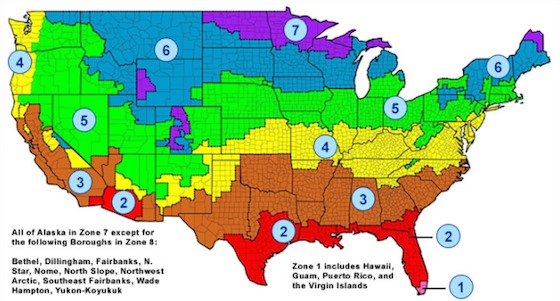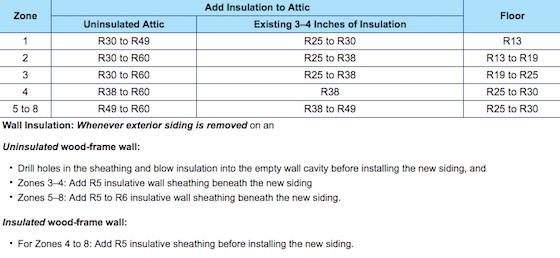R Value Meaning and Map
R Value Meaning & Map TIPS

This is a very good map showing the different insulation zones in the USA. CLICK THE IMAGE to get MORE INFORMATION.
- R stands for resistance
- Some insulation better than others
- Heat moves constantly
- Insulation slows heat transfer
- CLICK HERE to Get Tim's FREE & FUNNY Newsletter!
R Value - What It Means
You may be one that wonders what R value means. It's pretty easy.
The R represents the word resistance. Pretty good alliteration for 6:45 AM wouldn't you say?
R value is a measurement of resistance to heat flow. There's an entire body of science that studies heat. It's complex and called thermodynamics.
That's a cool word when you stop and think about it. Thermo describes heat and dynamics describes movement.
It's a perfect word because heat is constantly moving to a place where it's colder.
CLICK HERE to get FREE & FAST BIDS from local contractors to INCREASE your INSULATION.
Your Body
Think about your own body and how it reacts to heat and cold. In the summer if it's blistering hot, the heat tries to get inside your body.
Let's say it's 110 F outdoors and you're in Phoenix, Arizona. Your body is 98.6 F if you're feeling fine.
The extreme heat, even in the shade, is trying to creep into your body. You sweat to try to combat the heat transfer. But if you run out of water, it's over.
In the winter, you already know that without great clothes on your body loses heat faster than water going through a colander.
Insulation Resistance
Insulation is designed to slow the transfer of heat. Some insulation work better than others.
Fiberglass is not a bad insulation and it's found in many homes. It's cheap to make.
Foam insulation works better and it's part of the reason you find it in picnic coolers. On a per-inch-basis, foam slows down heat transfer better than fiberglass.
Moving Target
The US Department of Energy constantly develops new insulation guidelines. This happens so the bureaucrats stay busy and because there are technology changes that bring us better insulating materials.
Minimum Standards
The guidelines are minimum standards. There's absolutely nothing stopping you from installing more insulation. The only thing you need to consider is the long-term payback.
At the time I built my last house in Cincinnati, Ohio, the guidelines for ceiling insulation were an R-30 in my climate zone. I doubled that and installed an R-60 ceiling of blown-in fiberglass.
Did I waste my money? I think not. My neighbors fuel bills for houses smaller than mine were nearly double mine! To be fair, I built a new home and all the homes around me were at least thirty-five years old, some being fifty years old.
I had better wall insulation, better windows and an air-infiltration barrier.
CLICK HERE to get FREE & FAST BIDS from local contractors to INCREASE your INSULATION.
Big Savings Possible
I saved approximately $1,000 per heating season in that Cincinnati, OH house. I probably saved an additional $400 during the cooling season. Most of these savings can be attributed to my thicker sidewall insulation, an air infiltration barrier, and tight building practices. But no doubt I saved hundreds of dollars with the thicker attic insulation.
Savings Not Immediate
However, in your existing home, you might save $150 to $200 per year on average. If it costs you only $300 more to upgrade to an R-60 or more, do so! Within two to three years, you'll be saving money once you pay yourself back in energy savings the amount of money you spent on the extra insulation.
R Value Map
The following table shows the different R values that you need to achieve in ceilings, walls and floors with respect to the zone you live in. Study it for a few moments and it will make sense.

This is a very good map showing the different insulation zones in the USA. CLICK THE IMAGE to get MORE INFORMATION.

This table explains what you need to do depending upon which zone you live in. Look up at the map. (C) Copyright 2017 Me and every other US Taxpayer
CLICK HERE to get FREE & FAST BIDS from local contractors to INCREASE your INSULATION.
Column B165
2 Responses to R Value Meaning and Map